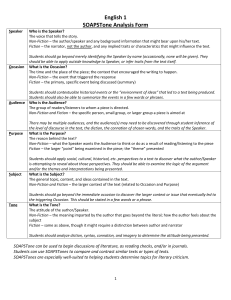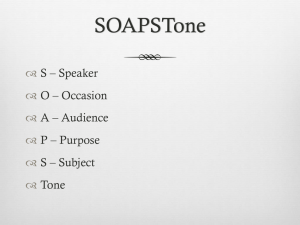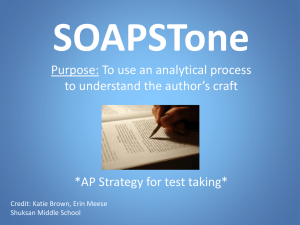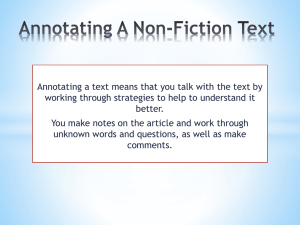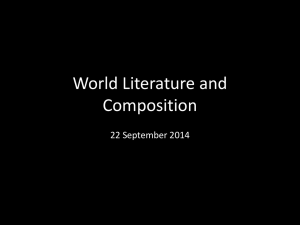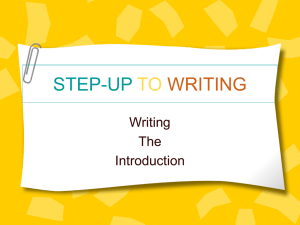English 1
advertisement
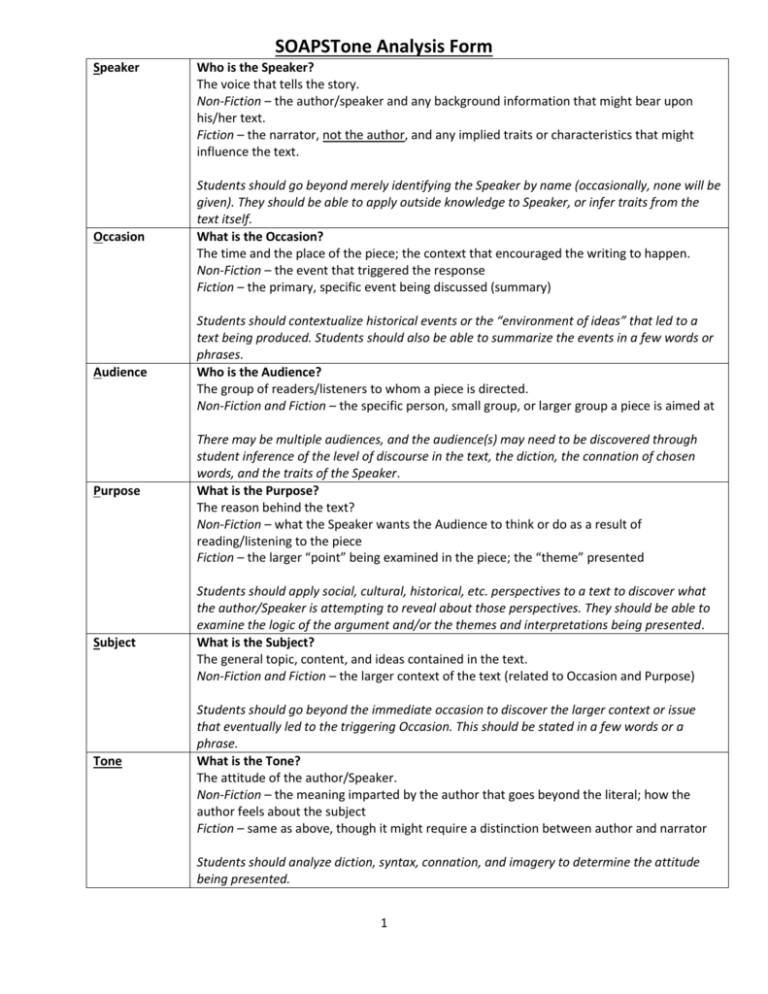
SOAPSTone Analysis Form Speaker Occasion Audience Purpose Subject Tone Who is the Speaker? The voice that tells the story. Non-Fiction – the author/speaker and any background information that might bear upon his/her text. Fiction – the narrator, not the author, and any implied traits or characteristics that might influence the text. Students should go beyond merely identifying the Speaker by name (occasionally, none will be given). They should be able to apply outside knowledge to Speaker, or infer traits from the text itself. What is the Occasion? The time and the place of the piece; the context that encouraged the writing to happen. Non-Fiction – the event that triggered the response Fiction – the primary, specific event being discussed (summary) Students should contextualize historical events or the “environment of ideas” that led to a text being produced. Students should also be able to summarize the events in a few words or phrases. Who is the Audience? The group of readers/listeners to whom a piece is directed. Non-Fiction and Fiction – the specific person, small group, or larger group a piece is aimed at There may be multiple audiences, and the audience(s) may need to be discovered through student inference of the level of discourse in the text, the diction, the connation of chosen words, and the traits of the Speaker. What is the Purpose? The reason behind the text? Non-Fiction – what the Speaker wants the Audience to think or do as a result of reading/listening to the piece Fiction – the larger “point” being examined in the piece; the “theme” presented Students should apply social, cultural, historical, etc. perspectives to a text to discover what the author/Speaker is attempting to reveal about those perspectives. They should be able to examine the logic of the argument and/or the themes and interpretations being presented. What is the Subject? The general topic, content, and ideas contained in the text. Non-Fiction and Fiction – the larger context of the text (related to Occasion and Purpose) Students should go beyond the immediate occasion to discover the larger context or issue that eventually led to the triggering Occasion. This should be stated in a few words or a phrase. What is the Tone? The attitude of the author/Speaker. Non-Fiction – the meaning imparted by the author that goes beyond the literal; how the author feels about the subject Fiction – same as above, though it might require a distinction between author and narrator Students should analyze diction, syntax, connation, and imagery to determine the attitude being presented. 1 SOAPSTone Examples Political Cartoon (Non-Fiction, Non-Text) Speaker: Occasion: Audience: Purpose: Subject: Tone: Anti-isolationist political cartoonist [believe it or not, the artist is Dr. Seuss] the attacks on England by Nazi Germany 1) other anti-isolationists 2) isolationists 1) support those who feel America should enter war 2)shame isolationists for their foolish views World War II mocking, humorous, satirical 2 SOAPSTone Examples Gettysburg Address (Non-Fiction) Four score and seven years ago our fathers brought forth on this continent, a new nation, conceived in Liberty, and dedicated to the proposition that all men are created equal. Now we are engaged in a great civil war, testing whether that nation, or any nation so conceived and so dedicated, can long endure. We are met on a great battle-field of that war. We have come to dedicate a portion of that field, as a final resting place for those who here gave their lives that that nation might live. It is altogether fitting and proper that we should do this. But, in a larger sense, we can not dedicate -- we can not consecrate -- we can not hallow -- this ground. The brave men, living and dead, who struggled here, have consecrated it, far above our poor power to add or detract. The world will little note, nor long remember what we say here, but it can never forget what they did here. It is for us the living, rather, to be dedicated here to the unfinished work which they who fought here have thus far so nobly advanced. It is rather for us to be here dedicated to the great task remaining before us -that from these honored dead we take increased devotion to that cause for which they gave the last full measure of devotion -- that we here highly resolve that these dead shall not have died in vain -- that this nation, under God, shall have a new birth of freedom -- and that government of the people, by the people, for the people, shall not perish from the earth. Speaker: President Abraham Lincoln – President during Civil War Occasion: Dedication of Cemetery near site of Battle of Gettysburg (November 19, 1863) Audience: 1)ostensibly, people attending ceremony 2)supporters of the Union 3)those wavering in support of Union 4)critics of the war 5)Confederates Purpose: 1)frame the Civil War as a conflict regarding the essential ideals of the US 2)state the importance of winning the War 3)support believers in the justness of the Union cause and bolster those wavering in support 4)address critics of the War 5)show Confederates the resolve of the Union Subject: 1) Civil War 2) America in general Tone: lofty, elevated, reverential, forceful, definitive, powerful Reveals the use of outside research (Occasion) 3 SOAPSTone Examples “To Be or Not to Be” Soliloquy from Hamlet 3.1.55-89 (Fiction) Speaker: Occasion: Audience: Purpose: Subject: Tone: Hamlet, disturbed Prince of Denmark – paranoid, depressed, seeking revenge 1) the appearance of his “friends” Rosencrantz and Guildenstern, who Hamlet no longer trusts 2) Hamlet’s angst at watching the First Player 3) the formations of Hamlet’s plans 1) if Hamlet feels he is alone: himself 2) if Hamlet feels he is being watched: Claudius, Polonius, and possibly Ophelia 1) if Hamlet feels he is alone: to work out his thoughts and further castigate himself 2) if Hamlet feels he is alone: to ponder suicide and/or murder 3) if Hamlet feels he is being watched: further his “antic disposition” 1) life, the universe, and everything 2) God, religion, justice, and punishment 3) suicide and murder 4) the consequences of death and/or murder high, elevated, depressed, moody, troubled, confused, “antic” Notice that Shakespeare is not the Speaker Note the complexity that is revealed through the use of SOAPSTone 4
